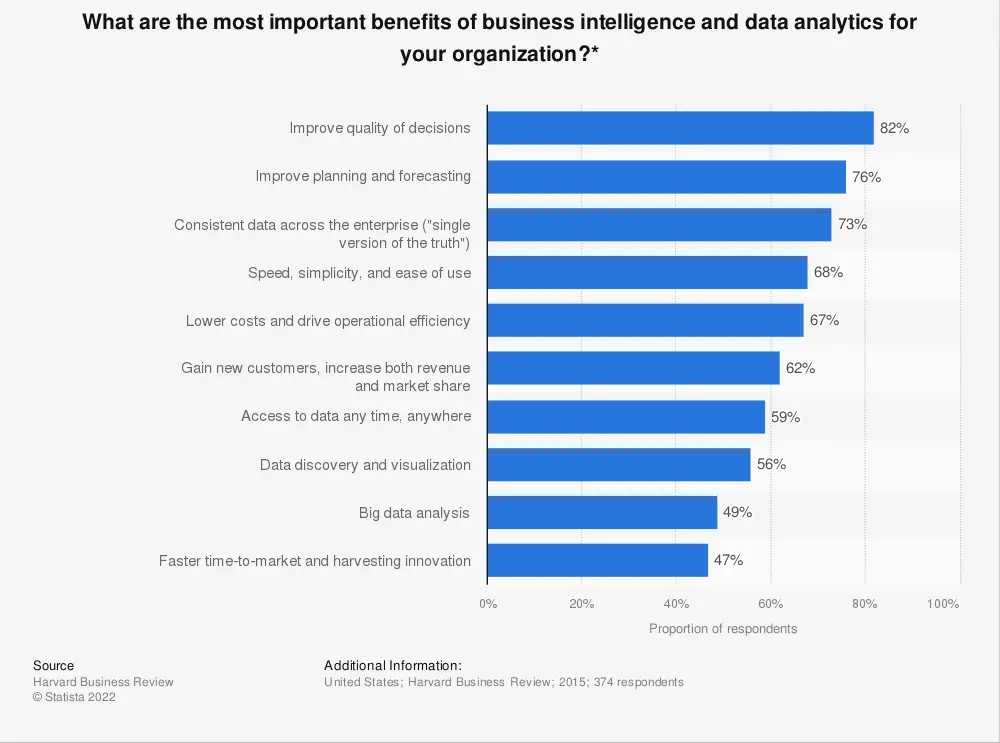Business intelligence, or BI, is an important aspect of data mining. BI can be defined as a type of information system that is designed to help organizations make better decisions.
In order to make better decisions, organizations need access to accurate and timely information. This is where business intelligence comes in. Business intelligence systems collect, store, and interpret data so that decision-makers can see trends, patterns, and relationships that they would not be able to see otherwise.
There are many different types of business intelligence systems, but all share the same goal: to provide decision-makers with the information they need to make informed decisions.
Some common examples of business intelligence systems include data warehouses, data marts, online analytical processing (OLAP) systems, reporting tools, and dashboards.
A data warehouse is a type of business intelligence system that stores historical data from multiple sources in one central location. Data warehouses are often used to track trends over time so that organizations can make better decisions about the future.
Data Marts
A data mart is a type of business intelligence system that stores a subset of data from a larger data warehouse. Data marts are usually used to support specific departments or business functions within an organization.
Online Analytical Processing (OLAP) Systems
An OLAP system is a type of business intelligence system that makes it easy for users to view and analyze multidimensional data. OLAP systems are often used for predictive analytics and forecasting.
Reporting Tools and Dashboards
Reporting tools and dashboards are types of business intelligence systems that display information in an easy-to-understand format. Reporting tools and dashboards can be used to track KPIs (key performance indicators), performance over time, and other important metrics.
Business intelligence is an important aspect of data mining. BI can be defined as a type of information system that is designed to help organizations make better decisions by providing them with accurate and timely information.
There are many different types of business intelligence systems, but all share the same goal: to provide decision-makers with the information they need to make informed decisions.
Some common examples of business intelligence systems include data warehouses, data marts, online analytical processing (OLAP) systems, reporting tools, and dashboards.
What Are The Benefits Of Using Business Intelligence In Data Mining Projects?
With the advent of big data, business intelligence (BI) has become increasingly important in data mining projects. BI platforms offer users the ability to access, visualize, and analyze data to make better-informed decisions.
1. Increased Efficiency
One of the biggest benefits of using BI in data mining projects is increased efficiency. With BI tools, users can easily access the data they need from a single platform. This eliminates the need to switch between multiple software programs or search through folders of data files.
In addition, BI tools allow users to automate repetitive tasks, such as generating reports. This frees up time that can be better spent on other tasks, such as analyzing results or brainstorming new ideas.
2. Improved Accuracy
Another benefit of using BI in data mining projects is improved accuracy. When data is spread across multiple software programs or files, it can be difficult to keep track of all the changes that are made.
This can lead to errors in reporting or analysis. With BI tools, users can see who made what changes and when those changes were made. This makes it easier to identify and correct errors.
3. Greater Insights
Another benefit of using BI in data mining projects is that it can provide greater insights into the data. For example, with BI tools, users can more easily spot trends and relationships between different pieces of data.
This can help users make better-informed decisions about their businesses. In addition, BI tools often come with built-in algorithms that can help users find hidden patterns in their data sets.
Overall, there are many benefits of using business intelligence in data mining projects. By using BI tools, businesses can increase their efficiency, improve their accuracy, and gain greater insights into their data sets.
If you’re thinking about starting a data mining project for your business, be sure to consider using a business intelligence platform to help you get the most out of your data set.
How Does Business Intelligence Help To Improve Decision-Making Processes In Businesses?
In any business, making informed decisions is essential to success. But in today’s data-rich environment, sifting through all of the available information can be overwhelming. That’s where business intelligence (BI) comes in.
BI tools and techniques help organizations to make sense of all the data and use it to improve decision-making processes.
One of the main benefits of business intelligence is that it can help to identify patterns and trends that would otherwise be difficult to spot. For instance, BI tools can help to track customer behavior over time. This information can then be used to make decisions about things like product development, marketing campaigns, and sales strategies.
Another way that BI can help businesses is by providing real-time information. This is useful for making decisions that need to be made quickly, such as reacting to changes in the market or addressing customer issues.
Finally, business intelligence can help to improve decision-making processes by providing a single version of the truth. When everyone in an organization is working with the same data, it reduces the chances of errors and misunderstandings.
Business intelligence is a powerful tool that can help businesses to improve their decision-making processes. By helping to identify patterns and trends, providing real-time information, and creating a single version of the truth, BI gives organizations the insights they need to make better decisions and stay ahead of the competition.

Are There Any Potential Drawbacks To Using Business Intelligence In Data Mining Projects?
Business Intelligence (BI) tools can be very helpful in data mining projects. However, there are some potential drawbacks that you should be aware of before using BI tools for your data mining project.
1. Lack of Flexibility
One potential drawback to using BI tools in data mining projects is that they can lack flexibility. This is because BI tools are designed to work with specific types of data and they may not be able to handle the type of data that you are working with. For example, if you are working with unstructured data, you may not be able to use a BI tool to analyze that data.
2. Time-Consuming
Another potential drawback to using BI tools in data mining projects is that they can be time-consuming. This is because BI tools are designed to automate certain tasks, such as data cleansing and transformation. However, this automation can take a lot of time, which can lengthen the overall duration of your project.
3. High Upfront Costs
Lastly, another potential drawback to using BI tools in data mining projects is that they can have high upfront costs. This is because BI tools are usually sold as part of a software suite, which can be expensive. In addition, the costs of training employees on how to use the BI tool can also add to the upfront costs of the project.
While there are some potential drawbacks to using BI tools in data mining projects, there are also many benefits that make them worthwhile. Some of these benefits include increased accuracy and efficiency in your project as well as being able to work with larger datasets. Ultimately, whether or not you decide to use a BI tool for your data mining project depends on your specific needs and objectives.
The Future Of Business Intelligence And Data Mining
Data is becoming increasingly important in today’s business world. There is a growing need for professionals who can collect, organize, and analyze data to make informed decisions.
This is where business intelligence (BI) and data mining come in. BI and data mining are two related but distinct fields that deal with extracting valuable information from data.
Data Mining
Data mining is the process of extracting valuable information from large data sets. Data miners use a variety of techniques, including statistical analysis and machine learning, to find trends and patterns in data. Data mining can be used to predict future events, identify customer trends, and much more.
As more businesses increasingly rely on data to make decisions, the demand for data miners will continue to grow. According to the U.S. Bureau of Labor Statistics, employment of computer and information research scientists, which includes data miners, is projected to grow 12 percent from 2019 to 2029, faster than the average for all occupations.
Business Intelligence
Business intelligence (BI) involves using software applications to collect, store, assess, and present business data. BI applications can help organizations make better decisions by providing up-to-date, accurate information about things like sales revenue, expenses, customer behavior, and much more.
The future of BI looks bright as well. As more businesses adopt BI applications and as those applications become more sophisticated, the demand for BI professionals will continue to grow. In fact, according to IBM, “the number of jobs advertised globally for business intelligence skills grew at twice the rate of IT jobs overall.
The future of business intelligence (BI) and data mining looks bright as businesses increasingly rely on data to make decisions. The demand for BI professionals is projected to grow 12 percent from 2019 to 2029, faster than the average for all occupations, according to the U.S. Bureau of Labor Statistics.
As more businesses adopt BI applications and as those applications become more sophisticated, the demand for BI professionals will continue to grow even further.
Conclusion
Business Intelligence is a powerful tool that can be used in data mining projects to improve decision-making processes in businesses. By using Business Intelligence, you can gain access to important information that can help you make better decisions about your business.
While there are some potential drawbacks to using Business Intelligence in data mining projects, the benefits of using BI far outweigh any disadvantages.
References
https://www.cio.com/article/272364/business-intelligence-definition-and-solutions.html
https://en.wikipedia.org/wiki/Data_mining
https://economictimes.indiatimes.com/definition/data-mining

